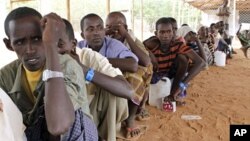The United Nations has urged “massive” action to save millions of people in the drought-stricken Horn of Africa region. The call came during an emergency meeting of U.N. aid agencies and charities at the headquarters of the Food and Agriculture Organization (FAO) in Rome.
The U.N. World Food Program (WFP) announced that it would begin an airlift of food aid on Tuesday into the Somali capital, Mogadishu, as well as to eastern Ethiopia and northern Kenya on the border with Somalia.
An estimated 3.7 million people in Somalia - around a third of the population - are on the brink of starvation. Millions more in Djibouti, Ethiopia, Kenya and Uganda have been struck by the worst drought in the region in 60 years.
Josette Sheeran, executive director of the World Food Program, said that a deadly combination of natural disaster and regional conflict had created this emergency, with soaring levels of malnutrition.
"WFP has ranked this as the most critical food emergency in the world. Last week I designated the Horn of Africa a Level 3 emergency," said Sheeran. "There is no higher for us. The scope of this is 13 million people."
FAO head Jacques Diouf, who hosted the emergency meeting at FAO headquarters in Rome Monday, said the catastrophic situation in Somalia demands massive and urgent international aid.
Diouf said it is imperative to stop the famine that afflicts the Horn of Africa and in particular southern Somalia.
French Agriculture Minister Bruno Le Maire said donor countries would hold talks to step up aid pledges in the Kenyan capital on Wednesday. He called for action to bring down high food prices on international markets.
Le Maire said if the necessary measures are not taken, famine would be the scandal of this century.
Officials say that the U.N. has received some $1 billion since first launching an appeal for the region in November 2010. But they added that a billion more is needed by the end of the year to cope with the emergency.
UN Seeks 'Massive' Action to Save Africa Drought Victims




